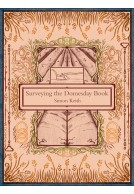Surveying the Domesday Book (Paperback)
Imprint: Windgather Press
Pages: 168
ISBN: 9781914427107
Published: 15th February 2022
Script Academic & Professional
(click here for international delivery rates)
Order within the next 1 hour, 50 minutes to get your order processed the next working day!
Need a currency converter? Check XE.com for live rates
The Domesday Book, commissioned in December 1085 by order of William The Conqueror, is generally thought to have been used to assess wealth and assets to collect taxes, and represents an incredible wealth of information on land-use, local economies, and even land disputes between neighbours.
This innovative analysis of the Domesday book from the perspective of a professional land surveyor and valuer aims to calculate a timetable for its creation, along with analysing the survey’s purpose, the nature of the data collected, and how it was used. By reverse-engineering the survey, Simon Keith proposes that while the document was an outstanding administrative success as a survey, it was in fact a fiscal failure which was never used directly to collect any taxes.
This fascinating study examines the foundation of the well-established, successful and sophisticated hidage assessments upon which the Domesday book was built, discusses the likely timeline of the survey, and examines the logistical problems which are universal to surveyors throughout history.
There are no reviews for this book. Register or Login now and you can be the first to post a review!
About Simon Keith
Simon Keith MA FRICS is a chartered surveyor qualified in the Rural Practice Division. After seven years in private practice with a UK national firm, he served 20 years in the Inland Revenue Valuation Office, latterly as Assistant Chief Valuer. He was Chief Executive of the Commonwealth Association of Surveying and Land Economy for five years. He was Senior Land Tenure Officer in the Food and Agriculture Organization of the United Nations until retiring in 1999. He was employed over a 35-year period as a consultant in 30 countries for the World Bank and many of the other multi-national organisations and national aid agencies.
















